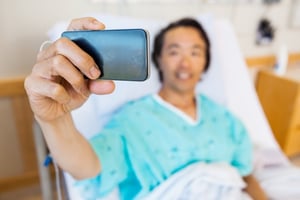 There's little doubt that WiFi is becoming an important element in modern healthcare. Are you leveraging it to boost your patient admissions and satisfaction numbers?
There's little doubt that WiFi is becoming an important element in modern healthcare. Are you leveraging it to boost your patient admissions and satisfaction numbers?
Today's hospitals and other healthcare facilities are facing more competition than ever before. Patients are now "shopping around" for healthcare in much the same way they comparison-shop for other services, and they are fully taking elements like hospitality WiFi availability into consideration. There are even websites that include Internet access and quality among their criteria, for people choosing a healthcare provider!
However, hospitals that are embracing a solid healthcare WiFi network are discovering it brings plenty of significant benefits. For example:
- More walk-in traffic from visitors at the cafe\gift shops.
- Increasing morale among the convalescent.
- New ways to transmit critical patient care information.
- More options in messaging and advertising voluntary procedures.
Of course, those benefits don't emerge unless your WiFi is good enough that your patients and other visitors want to use. So, let's talk a bit about the most critical elements in establishing a good healthcare WiFi system.
 Patient-Focused WiFi Design Brings The Best Results
Patient-Focused WiFi Design Brings The Best Results
1 - Have a free service.
There are a lot of arguments to be made for tiered Internet access,where guests pay extra for higher speeds. However, there should still be a free option that's good enough for basic web browsing, email, and other low-impact online activities.
Most patients feel they're getting nickle-and-dimed at hospitals to start with. There's no reason to add to that by charging for basic access.
2 - Use portal-based guest access.
Network security is a higher priority in hospitals than even in most businesses. Your guests need to be assured at every step that their private information is being kept private, and one good way to ensure this is putting all your WiFi users onto a "guest" network.
This network is segregated from all business functions, but still provides Internet access.
This is easy to accomplish, as most modern network OSes can set up a guest network with a few clicks. This simple procedure will eliminate most of the inadvertent security threats you might encounter.
3 - Hide your internal SSIDs.
The SSID is the name assigned to a network, which is usually visible to any device capable of scanning nearby WiFi access points. Hiding the SSID of a network means that no one can access it without already knowing the exact name assigned to it.
Besides the obvious network security benefits, this also reduces confusing among your patients. Their laptop or tablet will only see one SSID - the guest network - and therefore there would be no temptation at all to click onto any other networks.
Recovering patients are often very bored. Don't give them an excuse to fiddle around in areas of your network they shouldn't have access to.
4 - Ensure good coverage everywhere patients go.
Well, everywhere they go while they're awake, anyway.
One mistake we often see involves hospitals having strong WiFi signals in the lobby, that quickly degrade to nothing by the time it reaches a patient's room. And the only thing more frustrating than no Internet access is poor Internet access.
If you're offering WiFi in your hospital, you should put a little extra time into ensuring adequate signal strength throughout the building.
5 - Consider having some loaner tablets.
These days, low-end Android tablets are getting extremely cheap, with <$100 prices becoming increasingly common - especially when bought in bulk. Such devices are generally inadequate for long-term use, but for a patient lacking another means of online access, they're a godsend.
When the tablet is securely locked-down so the user can't change any settings, this is a cheap and effective way to greatly boost morale among recovering patients. (As well as giving them an alternative to daytime television!)
Is your hospital expanding its WiFi? Hummingbird Networks can help! Our staff of experts specialize in large deployments at locations like hospitals, hotels, and schools. Contact us for a free consultation.










